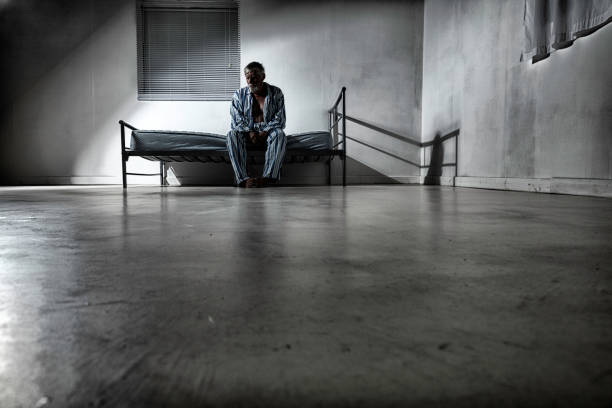This content is for informational and educational purposes only. Always consult a qualified healthcare provider.
Last Updated on June 19, 2024 by Grace Oluchi
Psychiatric wards help people with mental health problems and it can be an in-patient (staying at the hospital) or out-patient (visiting for the day) thing. They check your mental health, give you medicine, and have all kinds of talking treatments to help you feel better.
They also have fun activities like art, music, sports, and spending time with animals. Basically, they just want to help you feel good. The hospital has doctors, nurses, and other experts who are there all day and night to take care of you. You can have your own room and there are shared places where you can meet and talk with other people.
📋 Table of Contents
The Key Takeaway.
Going to any hospital can make you nervous, and it might feel scarier at a mental health one because of how people think about mental health or maybe it’s just your own worries. It’s good to find ways to stay calm and comfy while you’re there.
Why Would You Be Admitted to a Psychiatric Ward?
Sometimes, people are taken to psychiatric wards without their choice because it’s not safe for them to leave. This can happen if they:
- Think about hurting themselves.
- Might hurt other people.
- Use drugs or drink too much alcohol.
- Feel really upset or worried.
- Can’t look after themselves.
- Could be dangerous to others.
- Have trouble dealing with life at home or outside.
- Have a serious mental health problem that can’t be helped with regular doctor visits.
These involuntary admission are for people who might harm themselves or others because of their mental health. It’s also a way to help people who keep getting in trouble with the law because of their mental health issues, like not treating a mental illness properly.
I’ve Been Admitted Into A Psychiatric Ward. What Next?
When admitted into a psychiatric ward, they’ll take care of you until you’re ready to go home. You might stay there for a few days or weeks, it depends on how well you’re doing. Here’s what happens:
- The hospital team will check you out and decide the best way to help you.
- You’ll get some tests to see if there’s anything else making you feel sick.
- You’ll talk to a mental health expert. They’ll listen to your story and how you’re feeling now.
- Then, the doctor will give you the treatments to help you feel better and more relaxed.
Can You Leave a Psychiatric Ward?
People can leave the psychiatric ward when they’re safe and not going to hurt themselves or others. But sometimes, if the doctors think they need more help, they might have to stay longer.
Also, these wards often have rules about who can visit you. Most of the time, only your closest family can come see you. And they can only visit during certain hours and someone from the hospital might be there too.
Can You Admitted Involuntarily Into a Psychiatric Ward?
Yes. They can make you stay if they think you might be dangerous to the outside world. This is called “involuntarily committed”.


You know, a doctor has to say that you could hurt yourself or others before you can be made to stay without agreeing. They need to be really sure about how you’re acting and feeling to do this.
If your situation is really serious, they might use handcuffs or ankle cuffs to stop you. They can also use other ways to keep you safe, but only when it’s really needed.
Psychiatric Ward VS. Psychiatric Hospital.
Psychiatric wards and psychiatric hospitals are different. Psychiatric hospitals give long-term help to people with serious mental health issues and watch them closely.
Psychiatric wards give quick help for a short time to people who need urgent care for their mental health. You can find them in regular hospitals or psychiatric hospitals.
What are My Discharge Rights From A Psychiatric Ward?
Your General Discharge Rights.
Right when you get to the hospital, they start planning for when you can leave, no matter if you chose to be there or not. Even if a judge says you have to stay for a while, they still plan for your leave. You get to say what kind of help you think you’ll need when you go home and where you want to live.
If you’re okay with it, the hospital will try to tell your family before you leave. But if you don’t want that, you can tell the hospital to keep it quiet.
Your State Hospital Rights.
When you go to a state psychiatric hospital, they start planning for your going home right away. This plan is made with you, your care team, the local mental health group, and someone who can make decisions for you if you have one.
Sometimes the local mental health group doesn’t join in making this plan, even though they should. Since they’ll probably be helping you after you leave, it’s good to have them there. If they’re not there, you can ask for them to be included.
The plan for going home should at least have these parts:
- Figuring out what medical help and support you’ll need after you leave (like doctor visits and medicine).
- Figuring out what other help you’ll need (like a place to live, food, and clothes).
- Finding people and places in the community that can give you the help and support you need.
- Talking with you and the person who can make decisions for you about getting ready for life after the hospital.
Your doctor will make a detailed plan for your care after you leave, which includes:
- Where you’ll go that you like and can get to.
- What help and support you’ll get.
- Any problems that might make it hard for you to stay well.
- Your goals and what you want to achieve.
- What your final medical condition is called.
- Who will help you after you leave.
- How much medicine you’ll need until you see a doctor again.
- Who will give and pay for your medicine.
The hospital will also give you a week’s worth of medicine when you leave.
Your Rights If You’re In A Private Psychiatric Hospital.
When you’re in a private psychiatric hospital, they plan for when you can leave, but it’s a bit different from state hospitals. Here’s what you should know:
They have to include you in the planning, and your care team (called the Interdisciplinary Team or IDT) helps with this. The plan should cover:
- What kind of help you’ll need after you leave, like where you’ll live.
- The hospital staff will set up these services and support for you.
- They’ll talk to you and whoever is helping you make decisions to get ready for when you leave.
Your doctor will write down a summary that includes:
- What treatment you got and how you did with it.
- How you’re doing when you leave.
- Where you’ll go next.
- What kind of help you’ll get.
- What your mental health condition is called.
- How much medicine you’ll need until you see a doctor again, and who’s supposed to pay for it. But the hospital doesn’t have to give you the medicine for free.
Your Rights When You Have A Mental Health Hospitalization History.
If you’ve been to a psychiatric hospital a lot, like three times in six months, they pay extra attention to your plan for leaving. Here’s what they do:
- They look at your past plans to see what worked and what didn’t. They’ll keep the good stuff and add anything new that might stop you from coming back.
- They check to see what kind of help is out there and if it’s right for you. This includes the kind of help, how much, and for how long.
- They also think about if you need to stay in the hospital longer to get better.
Violated Psychiatric Facility Rights?
If you think your rights about leaving the hospital and how they plan it weren’t respected, here’s what you can do:
- Talk to the Client Rights Officer at the hospital for help.
- If you’re in a state mental health hospital, you can complain to the Office of Consumer Services and Rights Protection by calling 800-252-8154.
- If you’re in a private mental health hospital, you can call the Department of State Health Services Health Facility Compliance Group at 888-973-0022 to make a complaint.

